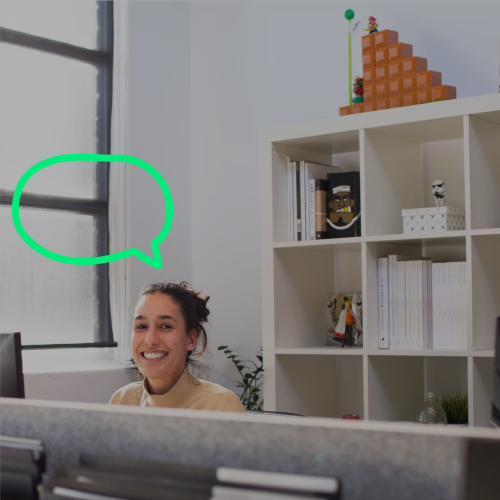A virtual secretary (or virtual receptionist) is a third-party agent who answers calls on behalf of another business. The highly trained virtual receptionists answer calls using a customised script to represent another business. For example, the agent may answer the call with the opening phrase, ‘Thank you for calling (Your company name). You’re speaking to Alex, how can I help you?’ For basic live answering services, the virtual receptionist takes a detailed message and then relays this information straight back to you via SMS, email, or telephone call.
Instead of diverting missed calls to an automated message bank, a virtual receptionist ensures that real humans answer the call. Approximately 90% of customers hang up when their call is diverted to an automated voicemail, so partnering with a virtual receptionist means that your business never misses a call or business opportunity again. It also means that the customers can contact your business and speak to someone at any time of the day. In most cases, a virtual receptionist is available 24/7, extending far beyond the traditional 9-5pm trading hours. A virtual reception service can help businesses of any size manage their calls more efficiently!
Our research team has collated 3 reasons why you should consider using a virtual receptionist.
1. Save Time
At TMC, we save you time from the tedious and monotonous tasks that consume your day. Instead of searching through your voicemail or scrap pieces of paper, a virtual receptionist streamlines your call handling processes. We provide an organised methodology for answering calls while you’re busy, in a meeting, on leave, having some time off, or simply cannot answer the phone. The agent answers the phone and notes down the details of the call so that you can return the query when you’re free. It ensures that all calls are answered, and then forwarded to you immediately. This allows you to return missed calls at your own convenience, enabling you to take back your time without worrying about the tedious administrative tasks consuming your day.
Partnering with a virtual receptionist streamlines your business’ communication needs. It ensures that all customers have a personalised point of contact 24hrs a day, 7 days a week. Understandingly, it can be frustrating from a customer perspective when the company you are trying to speak to doesn’t answer, or the call diverts to an automated voicemail. A virtual receptionist ensures that your business never misses a call again.
Furthermore, the scope of a VR is extremely broad. A virtual receptionist can offer live answering, after-hours call handling, overflow call handling, triage and escalation management, help-desk and technical support, bookings and appointment scheduling, email and support services, as well as live chat and social media management, and more. You can also add instructions to the service for the virtual receptionist to follow. For example, you may want to advise a specific timeframe to expect a call back or to stipulate that you’re in a meeting, or perhaps not available until tomorrow. The degree to which a virtual receptionist can assist your business is almost limitless. In conjunction with this flexibility, a virtual receptionist is also available 24/7. Unlike a traditional in-house receptionist who may only be available between 9-5pm, a virtual receptionist is available 24/7, meaning that your clients always have a point of contact during periods of full capacity or business closure. You may only want the virtual receptionist to answer the calls before opening hours or after-hours. It is in this way that a virtual reception service offers flexibility to businesses. With the right workflow and triage rules applied, this is a powerful asset to any customer service organisation.
2. Save Money
Instead of employing an in-house receptionist who might not be fully utilised, it is cheaper to utilise a virtual receptionist. When you employ an in-house receptionist, you’re subject to an array of employee expenses, some of which include salaries, commissions, worker’s compensation, annual or sick leave, superannuation and more. These are all fixed costs and must be paid. In contrast, a virtual receptionist utilises usage-based pricing. This means that you pay per call taken. It delivers better cost efficiency because you pay for each call taken. Rather than paying a fixed salary to an in-house receptionist, a virtual reception service allows you to convert your fixed costs into variable costs. In this way, a virtual receptionist service reduces the inherent costs associated with recruitment, hiring and training. Cutting and controlling these expenses allows for the allocation of funds to other departments essential to success.
Scalability is an additional consideration when deciding to use a virtual reception service. A virtual reception service allows you to scale your resources without investing in further management, capital or infrastructure. This has allowed many businesses leverage their cost savings and invest in other areas to facilitate expansion and growth. Businesses can engage a virtual receptionist for a fraction of the cost, compared to many other alternatives.
3. Business Continuity Planning
Virtual reception services have formed an integral part of many organisations business continuity planning (BCP) and broader risk mitigation strategies. Virtual receptionists can step in and help clients keep their business communication needs fully operational, particularly in the face of the COVID-19 pandemic. A BCP solution generally remains in a dormant state, but in high availability mode, such that it can be activated with little or no notice at all. Quite simply, if implemented properly, a virtual receptionist can make the difference between operational uptime or disruptive closure.
Implementing a robust BCP service relies heavily in solution design. For example, a virtual reception service must be customised to the exact business needs. This involves having a pre-determined script tailored to your business scope. It may also include access to third-party software such as a booking system or company web-based software (where required). The virtual receptionist handles these calls according to specific protocols that have been developed ahead of time. The virtual receptionist follows a custom script designed by you so that the operators stay on brand and on message. A clear and actionable messaged is then relayed to your team.
Having a virtual receptionist has become an integral partner to many organisations’ calls handling process and broader communication strategies. A VR services with broader scope such as overflow handling, afterhours, and 24/7 availability can be an important asset to any organisation’s BCP plan.
Set up a virtual reception service today!


